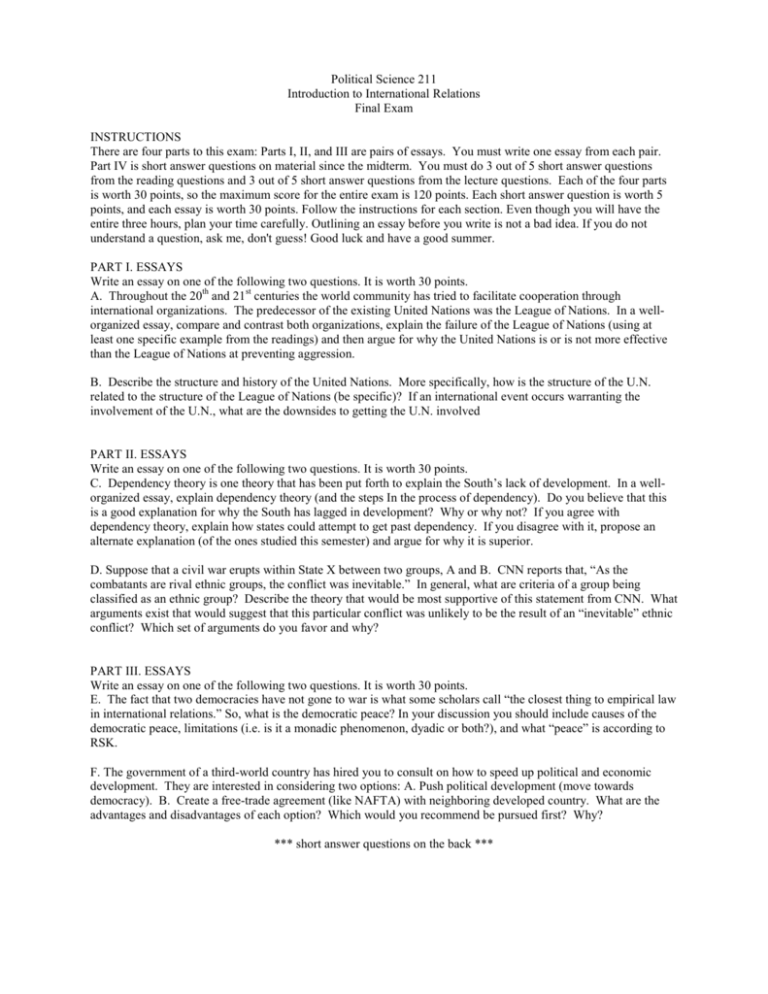Political Science 378
advertisement

Political Science 211 Introduction to International Relations Final Exam INSTRUCTIONS There are four parts to this exam: Parts I, II, and III are pairs of essays. You must write one essay from each pair. Part IV is short answer questions on material since the midterm. You must do 3 out of 5 short answer questions from the reading questions and 3 out of 5 short answer questions from the lecture questions. Each of the four parts is worth 30 points, so the maximum score for the entire exam is 120 points. Each short answer question is worth 5 points, and each essay is worth 30 points. Follow the instructions for each section. Even though you will have the entire three hours, plan your time carefully. Outlining an essay before you write is not a bad idea. If you do not understand a question, ask me, don't guess! Good luck and have a good summer. PART I. ESSAYS Write an essay on one of the following two questions. It is worth 30 points. A. Throughout the 20th and 21st centuries the world community has tried to facilitate cooperation through international organizations. The predecessor of the existing United Nations was the League of Nations. In a wellorganized essay, compare and contrast both organizations, explain the failure of the League of Nations (using at least one specific example from the readings) and then argue for why the United Nations is or is not more effective than the League of Nations at preventing aggression. B. Describe the structure and history of the United Nations. More specifically, how is the structure of the U.N. related to the structure of the League of Nations (be specific)? If an international event occurs warranting the involvement of the U.N., what are the downsides to getting the U.N. involved PART II. ESSAYS Write an essay on one of the following two questions. It is worth 30 points. C. Dependency theory is one theory that has been put forth to explain the South’s lack of development. In a wellorganized essay, explain dependency theory (and the steps In the process of dependency). Do you believe that this is a good explanation for why the South has lagged in development? Why or why not? If you agree with dependency theory, explain how states could attempt to get past dependency. If you disagree with it, propose an alternate explanation (of the ones studied this semester) and argue for why it is superior. D. Suppose that a civil war erupts within State X between two groups, A and B. CNN reports that, “As the combatants are rival ethnic groups, the conflict was inevitable.” In general, what are criteria of a group being classified as an ethnic group? Describe the theory that would be most supportive of this statement from CNN. What arguments exist that would suggest that this particular conflict was unlikely to be the result of an “inevitable” ethnic conflict? Which set of arguments do you favor and why? PART III. ESSAYS Write an essay on one of the following two questions. It is worth 30 points. E. The fact that two democracies have not gone to war is what some scholars call “the closest thing to empirical law in international relations.” So, what is the democratic peace? In your discussion you should include causes of the democratic peace, limitations (i.e. is it a monadic phenomenon, dyadic or both?), and what “peace” is according to RSK. F. The government of a third-world country has hired you to consult on how to speed up political and economic development. They are interested in considering two options: A. Push political development (move towards democracy). B. Create a free-trade agreement (like NAFTA) with neighboring developed country. What are the advantages and disadvantages of each option? Which would you recommend be pursued first? Why? *** short answer questions on the back *** PART IV. SHORT ANSWER QUESTIONS. Do 3 short answer questions from each of the two sets of short answer questions. SHORT ANSWER QUESTIONS FROM THE READINGS (5 points/answer). 1. As discussed in RSK chapter 15, what is the modernization theory of development? 2. According to Ch. 7 of Stiles, why is the reduction of emissions to control global warming a collective (public) good? Why is the reduction of emissions a difficult goal to achieve? 3. According to Ch. 14 of RSK, what is the difference between intergovernmental and supranational institutions? 4. According to Stiles chapter 8, what is the major lesson that the U.S. military has learned from the continuing insurgency in Iraq? 5. According to Ch. 2 of Stiles, why did the League of Nations’ actions fail to stop Italian aggression against Ethiopia? Why is the Italo-Ethiopian War considered a failure of the League of Nations? SHORT ANSWER QUESTIONS FROM THE LECTURES (5 points/answer). 6. Define terrorism. 7. At the beginning of the industrial revolution what choices were in principle available to countries in the periphery to prevent the growth of a large gap in development between the periphery and the center? 8. Why didn’t economic integration succeed outside of Europe? 9. Define nation building. 10. What are the basic resources needed to produce nuclear weapons?






